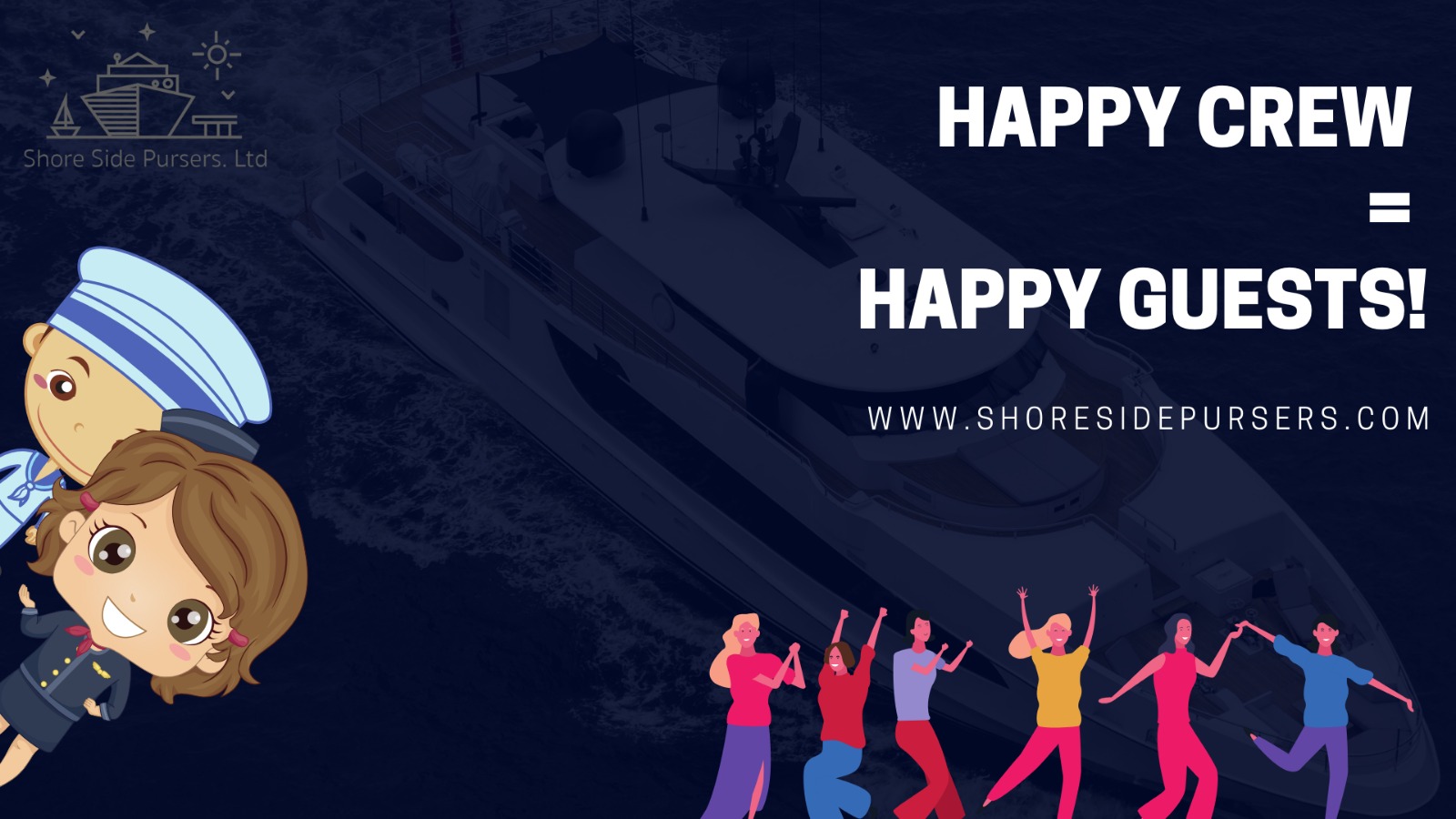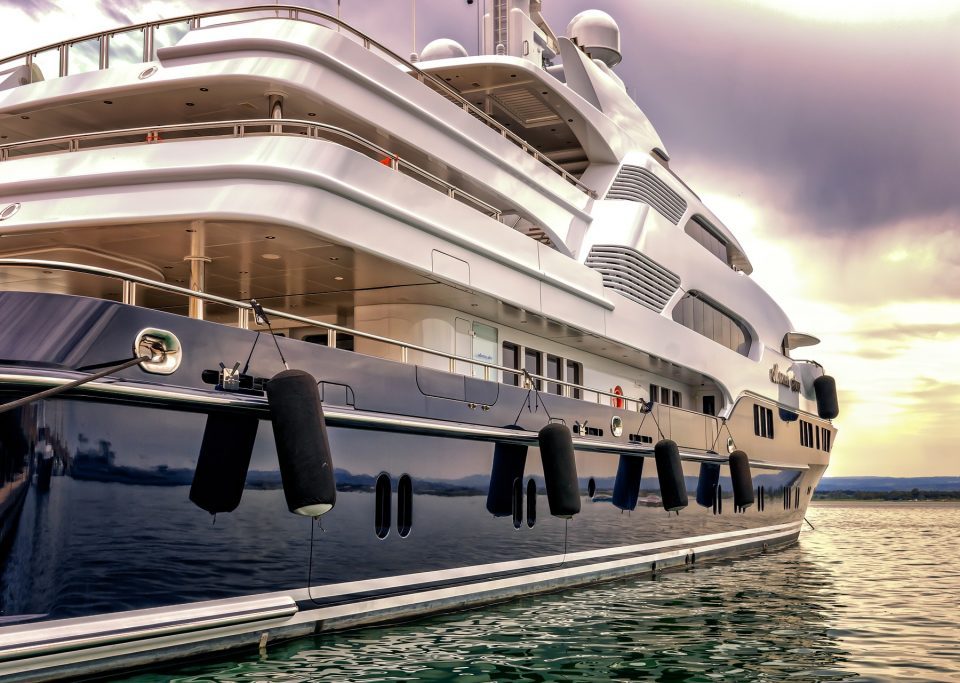It’s so simple – Happy crew = Happy guests

The virtual future for administration on board yachts
October 2, 2019
How having someone take over yacht administration shore side can lighten the load
January 13, 2020Happiness creates productivity
Everyone has been there at some point in their life, where their job position or role is too overwhelming, dis interesting or boring and a struggle to get through each day.
These negative feelings towards your job reinforce the disengagement of the actual tasks you must carry out and complete. Not understanding this, can cause major effects to the overall productiveness within your team or is detrimental to your whole company.
Check out a few stats regarding happiness in the work place and increased productivity -
So why is this significant fact not being followed through on board yachts, or being applied day to day, meaning the overall result would be an amazing guest experience?
Below are a few responses from crew of reasons why they felt unhappy on board -
Reason's for unhappy crew
- Working hours/Tiredness/Stress
- Being treated like a number and not a person
- Feeling that you are not cared for
- Not being listened to by HOD’s – For example - ideas junior crew may have that will not ever be considered that could possibly help systems on board
- Not being recognised for hard work
- Unfairness, for example - pay rises for preferred or favourite crew and not others
- Bullying
Ways you can change your attitude to create a happy working culture within your yacht crew
Looking at some of the points made above on why your crew may be unhappy, how can we then reverse this to create a happy productive workforce?
Working hours/Tiredness/Stress
Working long hours is generally a given cert when working on board yachts. It is the understanding of when you are pushing your crew way too far, to the point where they do not want to work with you anymore.
From personal experience and working on board many yachts, some with a fantastic program, others, not so much, I always wondered, why make your team, work unnecessarily when everything has been completed just for the sake of working?
In the yachting industry, although an amazing experience, travelling, seeing the world, earning large amounts of money and meeting great people, you also are giving up a lot personally. For example - time with your family, special occasions, personal time for yourself and self-care. Along with the fact of working ridiculously long hours, stress and the pressure of the job itself and living, working and socialising with the same people every day, some of them, you may not even get on with.
With these facts alone, when your crew do have that special down time, why make them work after a charter or guest trip, just for the sake of working? I have heard many a time – “It’s not in their contracts to get days off” “If they don’t like it then they can go, it’s not a prison” or “This is the yachting industry – It is what it is”. I find this mentality ludicrous.
Let’s say - After a crew have worked for 2 months straight without a day off, if the time arises, give them those available days off. Let them recharge their batteries. Have them enjoy themselves. Tell them to enjoy themselves. Of course, there will be rules on what they can do, to not be reckless, fly to another country, party too hard, etc.
What you are doing with this action, is showing that you care for their happiness and well being, and that they are not just a crew number on board.
I have seen this work first-hand – after the crew’s day/days off - they come back with stories to tell, a skip in their step and more energy to go right into the next guest trip. They will generally feel happier and more motivated to ensure for the next trip; the guests were just as happy as the last.
Every yacht has a different program, an example is that of a live on board owner. So, tackle this a different way - set a schedule each week so the crew have 1 day off, or 1 every 2 weeks. This gives the crew something to look forward to. To recoup their energy and giving them a bit of space.

Positive Reactions from giving crew a day off
- Energised
- More Positive Attitudes
- More Productive
- More Engaged in up and coming tasks
- Stronger team bonds
It really is a give and take scenario – the results of this will be the crew putting in much more effort, care and engagement into the tasks ahead of them. There are many ways to tackle this depending on the schedule of the yacht.
When making crew work for months on end, it is counterproductive, crew turnover is high, the unnecessary cost of this is high, and from this alone causes stress, tiredness, negativity and an unhappy place to work and live in.
Crew also talk amongst themselves; it is a claustrophobic environment and when the crew morale is low, it can be a very toxic, draining, negative and a disengaging place to work – again – counterproductive.
That little bit of time does wonders for crew’s welfare, attitudes, stress levels, productivity and engagement. This motivation will be carried right through to the guests. The crew’s engagement will be higher to achieve ultimate guest satisfaction.
Not being listened to by HOD’s
Another point raised above by crew members was, when they are working and experiencing a certain job role, they could often see an easier, better way of completing the task in hand. When voicing their idea to their HOD’s, they would quickly be shut down or not listened to at all.
Now, I know sometimes the idea may not work out for the better, but why not listen to and understand what your crew member is trying to explain, instead of dismissing them all together?
Crew mentioned certain responses they got from trying to put an idea forward “No it is fine; we have always done it this way” “I haven’t got time at the moment” or being laughed at.
This action creates a negative impact, especially if the idea that was raised is better than the practices already in place. Crew will feel like they are being dismissed, stupid for voicing their idea and feel angry towards the person that has shut them down. Again, as discussed before, crew talk to each other, the knock-on effect of this action creates a negative environment to work in.
Listening to them and trying to understand what is being communicated could possibly save the team time, still completing the task to the highest of standards plus making a task more simple and easier.
The crew member then feels appreciated, the team feel better as a task they had to carry out is made easier for them and this reinforces a more positive attitude from the crew.
If the idea doesn’t work, you can simply advise why it won’t, and thank the crew member for their contribution and deal with this in a positive way.
Not being recognised for hard work
Reports Inc. magazine, citing a Gallup study of 15 million workers state that the number 1 reason why people end up leaving their jobs is because they do not feel appreciated.
Let’s compare these findings to the yachting industry. From first-hand experience, I have seen crew turn over exceed expectations, all down to the pure fact that the crew did not feel appreciated for their hard work, they were dissatisfied in their jobs, burnt out and their place of work was a very unhappy place to be.
Us as humans consider gratitude an integral contribution to our general over all wellbeing. Psychologist Robert Emmons has spent nearly his entire career studying this topic alone. Gratitude Research.

The response you get from gratitude and when given in the workplace has many positive reactions –
- Increases happiness and satisfaction
- Builds your team, bonds and relationships
- Motivates your team to do their best
- Improves productivity
- Improves the result of what you are trying to achieve within your workplace (GUEST SATISFACTION)
To say thank you to your crew and show appreciation is such a simple action to implement into your work culture. The benefits will be shown in your crew’s energy levels, positive attitudes, enthusiasm and motivation.
I, for one always appreciated my boss telling me I had done a great job. It made me want to do better for them, I wanted to make them happy and it made me feel happy.
A great quote used by high-performance coach Robin Sharma: “Gratitude drives happiness. Happiness boosts productivity. Productivity reveals mastery. And mastery inspires the world.”
Below are a few examples of how you can create a positive work culture within your crew -
- General acknowledgement that they need time to recoup their energy with a day off, half a day, whatever suits the yacht’s program
- Acknowledging hard workers – showing appreciation, gratitude, saying thank you
- Being supportive, understanding your team
- Asking your team if they have any ideas and if they are good ones, implementing these ideas into the system
- Encouraging your team
- Appraisals
- Regular team meetings (10 minutes each morning) – Acknowledging what the team has achieved and for setting tasks ahead
- Crew dinners – to say thank you at the end of a season
- Organising crew activities – BBQ, go karting etc
Creating the link – Understanding why crew happiness is detrimental to the guest’s experience.
When broken down it is very basic. If your happy crew make for happy guests, then unhappy crew must make for unhappy guests. These crew will be more damaging to your team and overall guest trip/charter performance.
To not take the time to understand why your crew are feeling unhappy is destructive. It takes that little bit of extra time, building a positive work culture, being there for your team and showing care and empathy to your crew. The results will only ever be positive. Let’s face it, the main reason for all yacht crew positions is to ensure the guests have the most incredible experience that they will hopefully never forget.
I stick by the rule – A little bit of kindness goes a long way.
I would really like to see in the future, this method being practised and taken into action more frequently within the yachting industry.
Let’s not complicate things – It really is SO SIMPLE - Happy crew = Happy Guests.
More to come
If you enjoyed this post, we would be very grateful if you could help spread the word within the yachting industry by sending to a friend, linking or sharing on Facebook and LinkedIn.
Again, here is the link to our Website if you would like a more information.
Our next blog will be covering the topic of – How having someone take over yacht administration shore side can lighten the load. If you have any comments about this statement please feel free to write to us via our Contact Us Page.
You will hear from us very soon. Have a fantastic day everyone! 😊
Reference:
Camille Preston, PhD, PCC Forbes Councils Member. May 20, 2019. Retrieved from Forbes.
Psychologist Robert Emmons. July 30, 2001. Retrieved from Gratitude Research.

